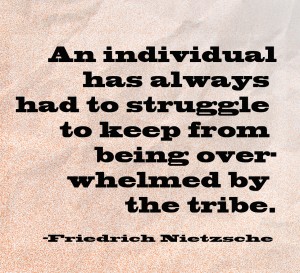Everything New is Old Again
Apparently coffee houses were the vice of choice for college students in Oxford in the 1600s. A recent NYTimes article talks about the jovial and intellectually stimulating atmosphere of Ye Olde StarrBuchs distracting people from work and school.
It’s the same song, 2nd verse as Facebook and other social networks are critics’ latest scapegoat of declining productivity levels at work today.
“Social network as efficiency killer” is an illusion, though, isn’t it? People will always find ways to shoot the breeze with co-workers and friends. The 17th-century coffee house is a fine example of the past social behaviors of the human worker. Equating historical cultural phenomena to today’s trends helps us understand and perhaps predict people’s behavior with new technologies.
Getting to the Heart of It
Preparing people for a new future by taking a peek into the past is all a matter of asking the right question.
Wrong question:
“What would Americans in 1820 have done with a cell phone?”
Right question:
“What did Americans in 1820 do with a steam engine or an electric light?
When we take a few steps back from the details, we see the constants that influence human behavior. The new question becomes:
“How have people, historically, reacted to major disruptions?”
If we want to look at a more detailed picture, we add in a little context:
“How have people adopted and adapted to new technology that changed their social environment drastically within 5-10 years?”
How We Mourn and Accept Change
I’ve asked these questions before with other examples that correlate well with today’s changing technology landscape. If we think about the introduction of washing machines and automobiles, we can see the progression of certain social requirements. People were expected to own more clothes and wash them more often. With cars, people were expected to accept that their grown children may move away and find different careers and spouses than those available in town.
In every new industrial revolution, there exist all types of early adopters, luddites and separatists. A change involves an ending of something. Endings often involve mourning. We get a little sad when we have to junk heap our first car. We love graduating from school but are sad to see it all end.
Along with taking a look at historical examples of industrial revolutions, I thought we could also gain some understanding on our mixed reactions to new tech by taking a look at the bittersweet twinge of grief that accompanies any advancement.
Using Elisabeth Kühbler-Ross’s famous 5 Stages of Grief (Denial, Anger, Bargaining, Depression, Acceptance), we can examine some typical reactions to sweeping social and cultural changes brought on by tech. Let’s look back into the past and imagine some reactions to the steam train and electric lamps:
DENIAL: “Those trains and electric lights won’t change this town one bit. We’re all going to be exactly the same people, doing the same things we always do.”
ANGER: “Who’s the idiot politician who brought in these train tracks and this electricity?! I’m going to run him over with my horse.”
BARGAINING: “If I buy up as much land as possible, I can keep the train tracks from going through town. If I preach about how electricity is the Devil’s light, we can go back to using gas lamps.”
DEPRESSION: “Just let them build the tracks. Nothing matters anymore. My whole world has been ruined. You can put the lights in but I’d rather just sit here in darkness until I die.”
ACCEPTANCE: “Okay. So there is a train. Maybe I can take it into the city to find work. And these lights are less dangerous than the gas-leaky ones.”
Today’s Bittersweet Tech
Let’s speed back up to today. Apply these stages to people’s reactions to the advent of cell phones:
DENIAL:
“Someday soon, I may be the last man in America without a cell phone. … I’m a dropout and aim to stay that way.”– Robert J. Samuelson, Newsweek 2004.
“I’ve yet to use a cellphone and I’ve never Tweeted or entered Facebook.” – Pico Iyer, NYTimes December 29, 2011
ANGER:
“I hate cell phones. Don’t you? After having a cell phone for about 3 years, I have realized that I am sick of them. I hate having to take calls and talking to people.” – User Pengwuino on Physicsforums.com Aug 23, 2005
“I hate Steve Jobs. I mean he got the whole world addicted to iPods, iPhones, iPads …” – Ming Jong Tey October 8, 2011 (<-He actually loves/hates Steve Jobs, though)
BARGAINING:
“Truthfully, I’d love nothing more than to go back to the days before cell phones and such. Kids actually got tans naturally because the went outside to play, and grade-school children didn’t have cell phones.” – Adam Bigelow, Quora March 12, 2013
“I would love to go back to the days before cell phones and before Internet.” – Anonymous 22 year old American female June 26, 2013
DEPRESSION:
“The last bastion of peace and (relative) quiet is slowly eroding away … I dread the day when everyone on the train is chatting with someone simply because they have nothing better to do during the commute.” – Owen Diaz September 9, 2012
“The trouble with the quiet car is simple: not everyone is quiet.” – Roi Ben-Yahuda December 31, 2010, on the use of cell phones in Amtrak’s “Quiet Car”
“Cell phones depress me. Artificial methods of conversation depress me.” – User Era-Sure December 11, 2006
ACCEPTANCE:
“We are living in an extremely exciting time in terms of science and technology.” – Jordan Lejuwaan May 5, 2010
“It’s a new world — and technology is a part of it.” – Stephanie Smith, Montana resident talking about Yellowstone National Park visitors, January 19, 2013
“President Obama recognizes that technology is an essential ingredient of economic growth and job creation.” – White House Official Website
Give Peace A Chance
There is a time and a place for every stage of mourning over societal changes. Have patience with your analog friends. Give encouragement to some sad saps. Most people will come around eventually, and then we can all discuss our collective history and our hopefully unified, unbound future.



Comments on this entry are closed.
This reminds me of a talk by Anaïs Saint Jude at Lift, about information overload. Nothing new, it’s something we always complain about and always blame new technology for (and which pushes us to develop technological solutions to, ironically). I find it fascinating how we humans react in really predictable ways to the world around us, but keep thinking our reactions are so unique.
Funny, right? Our lot in life seems to be the state of constant surprise at our modern surroundings. Thanks for the awesome info about to Anaîs St. Jude’s talk! Love it. Reactions to the Gutenberg printing press are especially relevant to today’s tech revolution. Hopefully more people will spread a similar “Don’t panic” message about tech. Everyone will catch up eventually but I guess, as a techie, I’m a bit impatient. I hate to see people wallow in a state of uncomfortable disruption. I understand it’s necessary for progress to happen, but I like to help to calm fears when I can.
While we think we living fancy technologically advanced times, we really live in technological primitive times. That’s why cell phones sound so bad. Here’s my experience of the history of phones: http://daisybrain.wordpress.com/2013/08/23/phones-or-whatever/